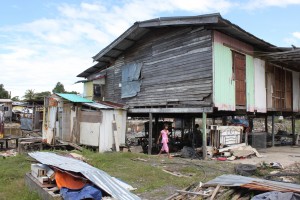The exploding number of illegal immigrants (PATI) in the state is threatening to engulf the entire economic, social, demographic and physical system of Sabah. Listed as the top issue that the electorate wants the government to solve, will BN be able to resolve this problem that it created?
 Sabah’s illegal immigrant (known as PATI) problem had begun almost from the inception of Malaysia. In the 1970s as a result of political and religious conflict in Southern Philippines, many Muslim refugees who fled to Sabah were granted political refugee status and were known as IMM13 refugees.
Sabah’s illegal immigrant (known as PATI) problem had begun almost from the inception of Malaysia. In the 1970s as a result of political and religious conflict in Southern Philippines, many Muslim refugees who fled to Sabah were granted political refugee status and were known as IMM13 refugees.
As of 2009 there were already 81,000 residents that were granted IMM 13 status which allows them to move around freely and seek employment (Malaysiakini, 5 October 2011).
However, the trickle of illegal immigrants led to a torrent of PATIs. As these refugees were overwhelmingly Muslims and had blood ties with the local Muslim natives, they were easily assimilated into Sabah’s society.
As a result, Sabah’s ethnic and religious composition was changed tremendously. In 1960, Muslims constituted 38 percent of Sabah’s population. In 2010, Muslims now formed 65 percent of the population.
Sabah’s population was 651,304 in 1970; by 2010, it had grown to 3,117,405, a staggering 479 percent increase. Foreigners now make up 28 percent of the population.
Political Weapon
Certain parties found it expedient to use PATIs as a foil to subdue the politically assertive non-Muslim natives and Chinese.
An allegedly state-sponsored program popularly known as Project IC began in the 1990s with the objective of altering the demographic pattern of Sabah. It was to make it more favourable to certain political parties, especially in regards to changing the electoral votingpatterns. (Mutalib M.D. “IC Projek Agenda Tersembunyi Mahathir?”)
Mutalib Md Daud, an author who had written extensively on the PATI issue in Sabah and a former executive secretary for Silam Umno division had testified in a court hearing in 1999 that of the 43,000 new Umno members recruited at the time, only 14,000 had genuine blue identity cards, the rest being of dubious ICs. (Justice Muhd. Kamil Awang, Election Petition No K11, 1999)
The suspected usage of PATIs as voters was put to devastating effect. From 1990 to 1994 Sabah was under PBS rule. PBS had left the BN coalition prior to the 1990 general elections. In 1994 Sabah held its state elections.
PBS was expected to win the elections handily due to the anti federal government sentiments as Jeffrey Kitingan, brother of the then popular chief minister Joseph Kitingan had just been released from an unpopular ISA detention in January 1994.
However the number of voters in Sabah had increased by 17.6 percent from 1990 to 1995 compared to the national average of 13.0 percent. Many of the newly registered voters were suspected to be PATIs.(1)
PBS barely scraped through with a much reduced majority. After PBS’s ignominious fall from power due to defections, BN regained power and never lost the state elections since then.
RCI
In a recent poll conducted by Merdeka Centre, PATI was listed as the top issue (53 percent) in Sabah. In the survey, an overwhelming 87 percent wanted an RCI on the PATI issue. However, only 54 percent believed that the commission will be able to address the problem.
On 1 June 2012, the federal government finally agreed to set up a Royal Commission of Inquiry (RCI) to investigate problems related to illegal immigration in Sabah.
The Terms of Reference (TOR) for the purpose of the commission however appear weak. One of the point states: “To investigate if the award of such ICs or citizenships were according to the law.”
The RCI came suspiciously close after the defection of several prominent Sabah BN politicians, who resigned in protest only a few days earlier because of the government’s reluctance to deal with the PATI problems.
Will the RCI solve the PATI problem? After decades of neglect, BN’s track record doesn’t inspire much hope for Sabah. Only a new government can resolve this issue. -The Rocket
Source
1. “When States Prefer Non-Citizens Over Citizens: Conflict Over Illegal Immigration into Malaysia Sadiq, Kamal (2005)



